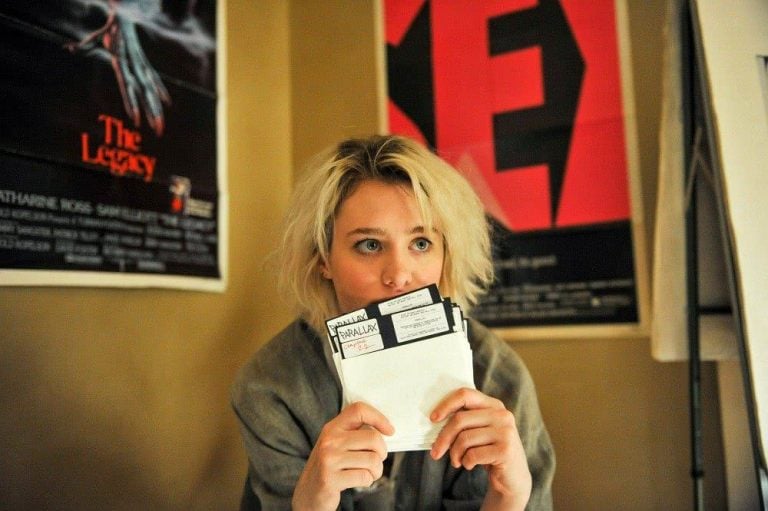Halt And Catch Fire never got to stand on its own two feet. “Halt And Catch Fire tries to reverse engineer Mad Men” read the AV Club’s May 2014 review of the show, and the comparison continued to dog the series throughout its first season, with reviewers finding plenty of similarities between Halt’s Joe McMacMillan (Lee Pace) and Mad Men’s Don Draper.
And sure, on face value, there are some things that twin the two. When Halt begins, it’s 1983, and IBM has just released its flagship personal computer, a boon for the industry. But as with any first models, there’s a flaw in the design, and a door that provides a way for all those hungry to take make their dreams come true is suddenly blown wide open.
Enter MacMillan, who storms into Cardiff Electric, a family-owned electronics business staffed by employees who started packing radios into boxes as teenagers. A wolf in the hen house, he’s a former IBM employee looking to usher the company into the new era.
He’s just recruited Cameron Howe (Blade Runner 2049‘s Mackenzie Davis), the scrappiest but most ingenious (and only female) coder from a college class, and now he’s going to find the most disgruntled genius on the sales floor Gordon, (Scoot McNairy) to make computer history with him. Together, the three plan to reverse-engineer IBM’s technology, ironing out the flaws and bringing in their own ideas to make something truly revolutionary.
As the AV Club’s early bit of muckracking proves, the reverse engineering plotline was the butt of many jokes from critics, as the naysayers rushed to claim the show was just trying to remix existing parts into something ultimately less effective.
And sure. while the first season of the show is indeed the weakest by far, proving disappointing largely for its disconcerting affection for its skeezy male antiheroes, even in those early days there was something subversive and charismatic about Halt.
Love Music?
Get your daily dose of metal, rock, indie, pop, and everything else in between.
Halt, despite dismal viewership and no real critical momentum until the third season, somehow defied all the odds.
Nonetheless, the most satisfying part of watching the show was tracking the confident growth and genesis from those unsatisfying early days to the masterpiece it became over its four year run. Somehow, Halt spent years staking out fresh territory for itself, the drama series telling not only a story of success and failure, but, just as importantly, the success in failure.
Halt’s heroes might be imperfect people, but its through their imperfections and frustrations that the show became its most human: for better or worse, these characters feel as familiar as family or friends. And over time, Halt only became smaller and smaller – more and more intimate – emerging in its final form as a disarmingly tender family drama.
This is a privilege rarely afforded to shows: usually, they either become so popular that they have to succumb to the demands of an overbearing fanbase, or so unwatched that their chance at a real future is snatched away from them. Halt, despite dismal viewership and no real critical momentum until the third season, somehow defied all the odds, feeling like an outlier in a landscape that sees shows fizzle too often.
Certainly in its earlier days, when it focused much more heavily on the frustration of broken dreams, Halt was significantly angrier and rougher and less contemplative than any of its contemporaries. Even then it had a voice of its own, and despite the frustrating self-destructiveness of its central characters, there were always miraculously visible signs of it writing itself to a brighter future.
In the first three episodes, it’s clear that aside from Cameron, the most interesting character is Donna (Kerry Bishé), who is stuck behind a desk at a rival company and in an unsatisfying marriage to Gordon – she is always the one left to pick up the pieces after another one of his harebrained schemes. She has a PhD in magnetic storage, but the only way she’s using it is to repair the toy her daughters break inbetween chopping the vegetables for that night’s dinner. But by episode four, when Donna is brought into hold everything for Gordon yet again, there is a hint of a gradually shifting focus in the air – this is clearly the last time she’s going to clean up after everyone else.
https://www.youtube.com/watch?v=nT4UvVoQakc
And in that way, what was once heading towards being another show about dissatisfied male geniuses realising their dreams quickly became a show about women and work. The following three seasons focus on what Donna and Cameron create together and apart over the next 12 years, and how they fight for their place in an industry they are continually locked out of.
At the same time, Halt’s main characters eventually discover two things – one, that the industry is gradually losing its human, hands-on origins and becoming a world of long lunches spent talking about things that will never materialise; and two, that it’s impossible to put a human into a box.
Indeed, in one of the final episodes of season three, a letter is read over the closing minutes. “If only we can learn to take care of each other, then this awesome new connection won’t isolate us. It won’t leave us in the end so totally alone,” it says. By this point, the show’s beginnings have never looked so far away, but regardless, the moment does recall something in the very first episode. “Computers aren’t the thing,” Joe says. “They’re the thing that gets us to the thing.”

































